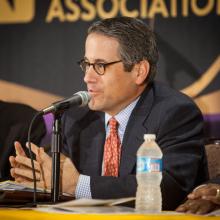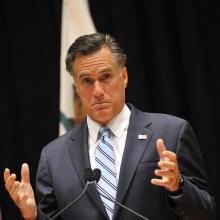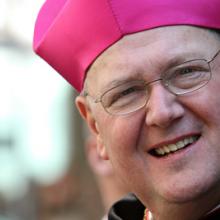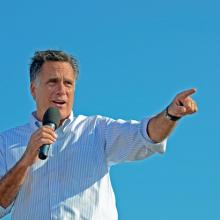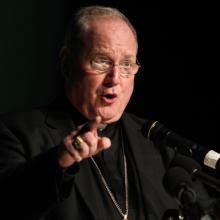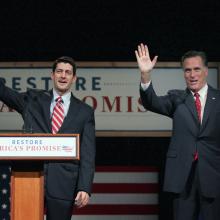Mitt Romney
BETHESDA, Md. — With voters focused intently on pocketbook issues, both Mitt Romney and President Barack Obama are framing their faith-outreach efforts around the economy as the presidential campaign enters its final weeks.
That marks a shift from previous election cycles, campaign advisers say.
“That’s a major difference between this election and the last. The economy is the single issue that transcends every demographic, every coalition, every interest group,” said Mark DeMoss, an evangelical who has led Romney’s efforts to rally conservative Christians — a key Republican voting bloc — around the GOP nominee, who is a Mormon.
“Evangelicals are no less interested in the unemployment rate and the cost of living than non-evangelicals,” DeMoss added.
Last night millions of Americans watched the first Presidential debate of the 2012 election season. During the 90-minute debate, there were significant policy discussions about a range of issues, deep disagreements between the two candidates, and even a threat to Big Bird’s job security.
Yet despite all the arguing there was much left unsaid by President Barack Obama and Gov. Mitt Romney.
Editor's Note: Tweet @newshour to ask the candidates to #TalkPoverty in Wednesday's debate.
Marianne Williamson, a bestselling author and convener of the upcoming Sister Giant conference on women and politics, has called on President Obama and former Governor Mitt Romney to address “a meaningful array of topics” – including poverty, money in politics and incarceration rates in the U.S. – tonight during the first presidential debate.
Williamson talked to us earlier today about these issues, which are particularly pressing for Christians who take Matthew 25 seriously.
The interview was edited for length and content.
Q: What are you doing to get these issues out there?
A: Having a voice and creating your own platform is not all that difficult with today’s technology. I think what’s happening now is that, firstly, people are realizing that. Secondly, people are realizing that there are certain things that need to be said that simply are not being said as loudly as other things being said. When it comes to a politics of conscience, why wouldn’t we expect that during the debates there would be a conversation about the 23.1 percent of America’s children living in poverty, or the 34 percent of poor children, or the 46 million Americans living in poverty?
I was groomed in a Latino home where nail salons were viewed as rites of passage for becoming a senorita — growing young lady. Sometimes when I’m looking for some TLC, I head to my local nail salon in East Harlem. I could go to a more upscale salon, but here at Pretty Nail Salon, is where I want to be — connected to a neighborhood of ladies who have utilized storefront nail salons, beauty parlors, and hair-braiding places as makeshift therapeutic spaces where counsel and support is just as paramount to looking beautiful.
I have also discovered that nail salons are burgeoning places of policy concerns. Pretty Nail Salon has provided me with an informal education on how social policy affects the everyday day lives of working class folks. Our presidential candidates could also benefit from an appointment at Pretty Nail Salon, to listen to the local narratives and deepen their understanding of how social policy is affecting the lives of the urban poor and working class.
My friend Mike Gerson wrote a significant column in the Washington Post today, titled "An Ideology Without Promise." It takes a deeper look at the now infamous Romney video and addresses the crisis that we all have to face now. I recommend reading Mike’s column. He says in part:
This crisis has a number of causes, including the collapse of working-class families, the flight of blue-collar jobs and the decay of working-class neighborhoods, which used to offer stronger networks of mentors outside the home. Perverse incentives in some government programs may have contributed to these changes, but this does not mean that shifting incentives can easily undo the damage. Removing a knife from a patient does not automatically return him to health. Whatever the economic and cultural causes, the current problem is dysfunctional institutions, which routinely betray children and young adults. Restoring a semblance of equal opportunity — promoting family commitment, educational attainment and economic advancement — will take tremendous effort and creative policy.
The white working class, a potentially rich bloc of voters for Republicans or Democrats, hasn’t settled on Mitt Romney or President Barack Obama, a new study from the Public Religion Research Institute shows.
“These white working class voters are not particularly enamored of either candidate,” said Daniel Cox, PRRI’s research director. “In terms of their favorability, they’re both under 50 percent.” Forty-four percent look favorably upon Obama and 45 percent upon Romney.
Released seven weeks before the election, the August survey found Romney with a double-digit lead over Obama among the white working class, which preferred the GOP candidate 48 to 35 percent.
But Cox points out that the gap narrows to statistical insignificance among women voters in this group, and in the Midwest and West, home of several swing states. The upshot for Romney and Obama?
If they want to woo this group, which makes up 36 percent of the nation according to the study, the campaigns may want to consider other findings of the PRRI poll.
The recently revealed video of Gov. Mitt Romney at a fundraising event last May is changing the election conversation. I hope it does, but at an even deeper level than the responses so far.
There are certainly politics there, some necessary factual corrections, and some very deep ironies. But underneath it all is a fundamental question of what our spiritual obligations to one another and, for me, what Jesus' ethic of how to treat our neighbors means for the common good.
Many are speaking to the political implications of Romney's comments, his response, and what electoral implications all this might have. As a religious leader of a non-profit faith-based organization, I will leave election talk to others.
As the faith leaders said yesterday, we have no choice but to respond when we learn that so many of our brothers and sisters are living in poverty. It makes these presidential candidate videos ones that every Christian should watch before they vote.
We asked the candidates, what will you do to address the highest numbers of people in poverty in America in almost 50 years—numbers that we learned today are still growing? We believe these messages from the Presidential candidates should lift the issues of poverty into the national debate into this election season.
We invite members of the press to watch these videos and to question these candidates even further about their visions and policy choices for overcoming poverty. The poverty numbers that came out yesterday require responsible journalists to make the question of poverty an important part of this election year discussion.
Christian leaders asked, and the presidential nominees answered. The poverty rate in America is still at a staggering 15 percent and 46.2 million Americans remain in poverty — what is your plan to address the problem?
The Circle of Protection, composed of Christian leaders from across the religious spectrum, released President Barack Obama's and GOP nominee Mitt Romney's video responses today at the National Press Club in Washington, D.C.
(VIDEOS from Obama and Romney after the jump.)
"In a democracy, the people get the government they deserve." – Alexis de Tocqueville
With the Democratic and Republican national conventions behind us, and an increase of political campaigning in front of us, we recognize the timeliness of the above quotation from Alexis de Tocquville. In a democracy the citizens choose their government, thus we indeed receive the government we deserve. As Lisa Sharon Harper recently stated:
"In its purest form, politics is simply how we organize our life together in society…in a Democratic Republic like our own, the [people are] ultimately responsible for the policies, laws, and structures that guide daily life. As we vote for candidates and ballot measures, we shape our society."
With such thoughts in mind, we affirm the collective ability to “shape our society," but we do so not only through the ability to choose our candidates and pass ballot measures, but we also possess the capacity to shape the process of how our leaders and policies are selected. In other words, while many complain about the high quantity and low quality of political campaigns, we are confronted with a harsh reality: In a democracy, we get the political campaigns we deserve.
I’ll be honest … I’m a coward. During the political season I find myself avoiding certain conversations that I do care about. Mind you, I do have opinions. My wife would say I have an opinion on everything. Faith and social issues are extremely important to me, and I have spent a lot of years studying and following the trends and their impact on people I care a lot about. I am especially focused on issues that affect the poor, mentally ill, unemployed, addicted, and homeless. Topics of Medicare, unemployment benefits, the death penalty, gun control, abortion, gay marriage, state and federal budget and deficits, immigration, and foreign policy all matter to me. I do have opinions! (And I vote!)
Yet during the final months of America’s presidential street fight, I tend to lay low. I know that one simple conversation with almost anyone can turn volatile and unleash the beast within them. If educated congressmen, presidential candidates, governors, and even local representatives can be as nasty and polarized as they have publicly shown, there is little reason to honestly discuss an issue, since the potential for alienation and misrepresentation is at an all-time high. No one seems to be listening, having crystallized their presuppositions with a crafty skill of spinning any topic into their agenda. Ironically, our children are watching adult leaders model behavior we wouldn’t let them get away with.
NEW YORK — Cardinal Timothy Dolan, who sparked controversy by agreeing to deliver the closing blessing at the Republican convention in Tampa this week, on Monday drew further attention to his political role by asking both Mitt Romney and Barack Obama to sign a “civility pledge” promoted by a leading conservative Catholic activist.
The archbishop of New York wrote to Romney and Obama, as well as their running mates, Paul Ryan and Joe Biden, asking them to sign the “Civility in America” pledge developed by Carl Anderson, head of the powerful Knights of Columbus and a man with long-standing ties to the Republican Party.
The news that New York Cardinal Timothy Dolan, the nation’s most prominent Catholic prelate, will deliver the closing blessing to the Republican National Convention in Florida next week was seen as a huge coup for Mitt Romney, the party's presumptive nominee. But the move has also prompted a sharp debate within the church over the increasingly close ties between leading bishops and the GOP.
“The cozy relationship between a sizable portion of U.S. bishops and the Republican Party should be cause for concern, and not just among progressive Catholics,” Michael O’Loughlin wrote in a post on the website of America magazine, a leading Catholic weekly published by the Jesuits.
“Cardinal Dolan’s appearance in Tampa will damage the church’s ability to be a moral and legitimate voice for voiceless, as those who view the Catholic Church as being a shill for the GOP have just a bit more evidence to prove their case,” O'Loughlin concluded.
Mitt Romney says in a new interview that one of the reasons he’s distressed about disclosing his tax returns is that everyone sees how much money he and his wife, Ann, have donated to his Mormon church, and that’s a number he wants to keep private.
“Our church doesn’t publish how much people have given,” Romney tells Parade magazine in an edition due out on Aug. 26. “This is done entirely privately. One of the downsides of releasing one’s financial information is that this is now all public, but we had never intended our contributions to be known. It’s a very personal thing between ourselves and our commitment to our God and to our church.”
Romney has released his 2010 tax returns in his White House campaign and, so far, a summary of last year’s tax information. But despite pressure from Republican opponents in the primaries and President Obama’s re-election campaign, Romney has refused to disclose more.
While it may not be a major reason, Romney says disclosing his charitable donations isn’t something he wants to do.
Both President Barack Obama and presidential candidate Mitt Romney have been somewhat hesistant to discuss their faith in detail during the campaign season. In a recent poll by the Pew Forum on Religion and Public Life, fewer than 50 percent of Americans identified Obama as a Christian. About 60 percent knew Romney is Mormon.
The two discussed their faith in eight questions presented by Washington National Cathedral's magazine Cathedral Age. From the release:
"'First and foremost, my Christian faith gives me a perspective and security that I don’t think I would have otherwise: That I am loved. That, at the end of the day, God is in control,' said President Obama. “Faith can express itself in people in many ways, and I think it is important that we not make faith alone a barometer of a person’s worth, value, or character.'
Governor Romney said, 'I am often asked about my faith and my beliefs about Jesus Christ. I believe that Jesus Christ is the Son of God and the Savior of mankind.'"
For the full story, go HERE.
New York Cardinal Timothy Dolan defended his invitation of President Obama to the annual Al Smith Dinner in October, saying he is trying to encourage civility and dialogue amid a bitter battle with the White House over abortion rights and access to contraception.
Dolan has received “stacks of mail protesting the invitation to President Obama,” he wrote in an Aug. 14 blog post. At issue are Obama’s new health care regulations, which require employers to provide insurance plans that cover contraceptive services for women.
Conservatives and the U.S. Conference of Catholic Bishops – of which Dolan is president – have criticized the regulations, which they say abridge the religious freedom and conscience rights of faith-based employers.
But the nonpartisan charity dinner is a time for civility, engagement, and dialogue, Dolan wrote.
“Those who started the dinner 67 years ago believed that you can accomplish a lot more by inviting folks of different political loyalties to an uplifting evening, rather than in closing the door to them,” Dolan wrote.
Republican presidential candidate Mitt Romney announced Rep. Paul Ryan as his vice presidential pick early Saturday morning. Romney is set to officially announce the Wisconsin representative at 9 a.m. in Norfolk, Va.
Romney made the announcement via his smartphone app, and his website refers to the duo as the "A" team, saying: "This is the team to beat. This is the team that can restore greatness in America. This is the team that can fix America."
Visit NBCNews.com for breaking news, world news, and news about the economy
Republican presidential candidate Mitt Romney accused Democratic President Barack Obama of launching a “war on religion” in a television ad released on Aug. 9.
“President Obama used his health care plan to declare war on religion, forcing religious institutions to go against their faith,” the ad’s announcer states.
The ad pans to a shot of Romney on his recent visit to Poland saying, "In 1979, a son of Poland, Pope John Paul II, spoke words that would bring down an empire. Be not afraid."
It concludes, “When religious freedom is threatened, who do you want to stand with?”
THE TAR SANDS in Alberta, Canada, have been in the news a lot lately, since they appear to be a promising source of energy for the United States, a nation hungry for a fuel derived by despoiling pristine forests, fouling fresh water sources, and enriching oil executives. (Nobody said capitalism would be pretty. Cute and cuddly, perhaps, but not pretty.)
Actually, I’m not familiar with this new type of energy source. Is it the tar we want, or the sand? Probably not the tar, since it’s too sticky and is mainly used as a preservative for saber-toothed tiger skeletons in California, something I learned in an eighth grade history book with lots of pictures. (I like pictures.)
So it must be the sand, which one day our cars will run on, to which I must add: Are our scientists brilliant, or what?!
Unfortunately, extracting this energy source domestically could be a direct threat to our beaches, the nation’s principal source of sand. Which is why I plan to Occupy the Beach of My Choosing later this summer, and stand in powerful protest—or, after a heavy picnic lunch, lie on a blanket in powerful protest—against exploiting this valuable resource.
Come to think of it, Saudi Arabia has lots of sand. So maybe we can get it from them.
Writing for The Huffington Post, Eric Sapp takes a closer look at a recent Pew Forum poll:
Here's a key point in the poll that didn't get much attention: 82 percent of those who know Obama is Christian say they are comfortable with his religion. So voters are basically twice as comfortable with Obama's faith when they know what it is. This is why faith outreach is so important (but more on that later).
Why does the fact that most voters are not comfortable with Obama's religion matter? More than two-thirds of voters (and seven-in-10 women voters) say they want a president with strong religious beliefs. As one might imagine, these numbers are even higher with religious populations. Eight-in-10 Protestants and three-in-four Catholic voters want a president with strong religious beliefs. And let's be honest, they aren't talking about wanting Obama to have strong Muslim beliefs (so the fact that 17 percent of voters think he's Muslim doesn't add to the plus column)!
Read more of Eric's analysis here
